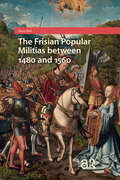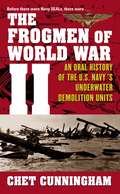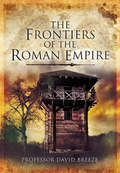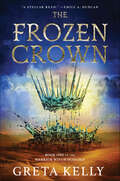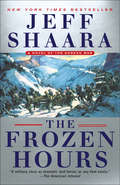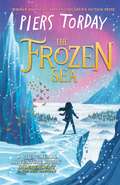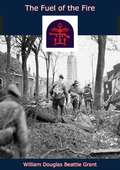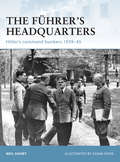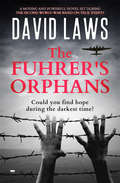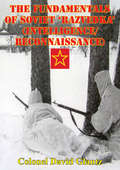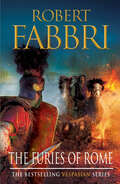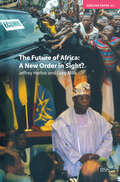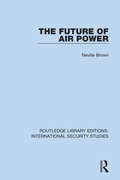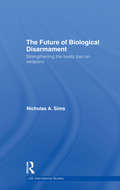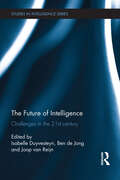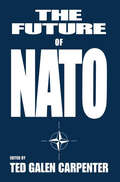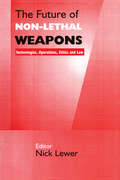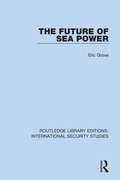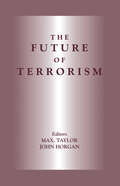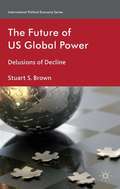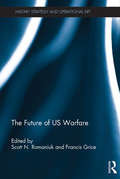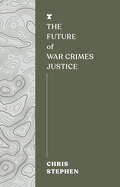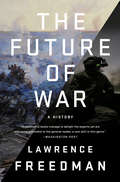- Table View
- List View
The Frisian Popular Militias between 1480 and 1560
by Hans MolIn the late Middle Ages and early modern times, able-bodied men between sixteen and sixty years of age were called upon all over Europe to participate in raids, sieges and battles, for the defense of home and hearth. Because these men are regarded as amateurs, military historiography has paid little attention to their efforts. This book aims to change that by studying the mobilization, organization and weaponry of popular levies for a time when war was frequently waged between states in the making. Central to the book is the composition and development of the rural and urban militias in Friesland, dissected in a comparative Northwest European perspective, along with an examination of why the self-defense of the Frisians ultimately failed in their efforts to preserve their political autonomy. The main source is an extensive series of muster lists from 1552 that have survived for six cities and fourteen rural districts.
The Frogmen of World War II
by CunninghamAs countless battlefronts in the Pacific, African, and European theaters called for direct amphibious assaults against islands and beachheads, a small corps of exceptionally skilled fighting men was formed -- the U.S. Navy underwater warriors. Beginning in 1943, these men undertook never-before-attempted missions ranging from eye-to-eye recon of enemy-held positions to staging the demolition of shoreline obstacles and clearing the way for landing craft. Here, in their own words, are the true stories of these aquatic commandos, whose daring exploits and bravery would pave the way for thousands of American fighting men around the globe -- and whose recolitionary training and fighting methods would evolve into the modern specail forces known as the Navy SEALs.
The Frontiers of the Roman Empire: Interpreting The Frontiers Of The Roman Empire World Heritage Site (Heritage Matters Ser. #12)
by David Breeze&“Practically all new information on the greatest empire of all and how it controlled and policed its frontiers. Absolutely fascinating!&”—Books Monthly At its height, the Roman Empire was the greatest empire yet seen with borders stretching from the rain-swept highlands of Scotland in the north to the sun-scorched Nubian desert in the south. But how were the vast and varied stretches of frontier defined and defended? Many of Rome&’s frontier defenses have been the subject of detailed and ongoing study and scholarship. Three frontier zones are now UNESCO World Heritage sites (the Antonine Wall having recently been granted this status—the author led the bid), and there is growing interest in their study. This wide-ranging survey will describe the varying frontier systems, describing the extant remains, methods and materials of construction and highlighting the differences between various frontiers. Professor Breeze considers how the frontiers worked, discussing this in relation to the organization and structure of the Roman army, and also their impact on civilian life along the empire&’s borders. He then reconsiders the question of whether the frontiers were the product of an overarching Empire-wide grand strategy, questioning Luttwak&’s seminal hypothesis. This is a detailed and wide-ranging study of the frontier systems of the Roman Empire by a leading expert. Intended for the general reader, it is sure also to be of great value for academics and students in this field. The appendixes will include a brief guide to visiting the sites today.&“The result of this book-crafting care and Breeze&’s erudition is a near-perfect example of specialized military history done for a popular audience.&” —Open Letters Monthly
The Frozen Crown: A Novel (Warrior Witch Duology #1)
by Greta Kelly"Propulsive and intricate, Greta Kelly has constructed a world of twisting politics and thrilling magic following a heroine who is both clever and uncompromising, but ultimately, has heart. A stellar read that I thoroughly enjoyed." -- Emily Duncan, New York Times bestselling author of Wicked Saints A princess with a powerful and dangerous secret must find a way to save her country from ruthless invaders in this exciting debut fantasy, the first novel in a thrilling duology packed with heroism, treachery, magic, and war.Askia became heir to the Frozen Crown of Seravesh because of her devotion to her people. But her realm is facing a threat she cannot defeat by sheer will alone. The mad emperor of the Roven Empire has unleashed a horde of invading soldiers to enslave her lands. For months, her warriors have waged a valiant, stealth battle, yet they cannot stop the enemy’s advancement. Running out of time, she sets sail for sun-drenched Vishir, the neighboring land to the south, to seek help from its ruler, Emperor Armaan.A young woman raised in army camps, Askia is ill-equipped to navigate Vishir’s labyrinthine political games. Her every move sinks her deeper into court intrigues which bewilder and repel her, leaving her vulnerable not only to enemies gathering at Vishir's gates, but to those behind the palace walls. And in this glittering court, where secrets are worth more than gold, Askia fears that one false step will expose her true nature. For Askia is a witch gifted with magical abilities—knowledge that could destroy not only her life but her people. As her adversaries draw closer, Askia is forced to make an impossible choice—and no matter what she decides, it may not be enough to prevent Seravesh’s fall.
The Frozen Hours: A Novel of the Korean War
by Jeff Shaara<P>The master of military historical fiction turns his discerning eye to the Korean War in this riveting new novel, which tells the dramatic story of the Americans and the Chinese who squared off in one of the deadliest campaigns in the annals of combat: the Battle of Chosin Reservoir, also known as Frozen Chosin. <P><b>June 1950.</b> The North Korean army invades South Korea, intent on uniting the country under Communist rule. In response, the United States mobilizes a force to defend the overmatched South Korean troops, and together they drive the North Koreans back to their border with China. But several hundred thousand Chinese troops have entered Korea, laying massive traps for the Allies. <P>In November 1950, the Chinese spring those traps. Allied forces, already battling stunningly cold weather, find themselves caught completely off guard as the Chinese advance around the Chosin Reservoir in North Korea. A force that once stood on the precipice of victory now finds itself on the brink of annihilation. Assured by General Douglas MacArthur that they would be home by Christmas, the soldiers and Marines fight for their lives against the most brutal weather conditions imaginable—and an enemy that outnumbers them more than six to one. <P>The Frozen Hours tells the story of Frozen Chosin from multiple points of view: Oliver P. Smith, the commanding general of the American 1st Marine Division, who famously redefined defeat as “advancing in a different direction”; Marine Private Pete Riley, a World War II veteran who now faces the greatest fight of his life; and the Chinese commander Sung Shi-Lun, charged with destroying the Americans he has so completely surrounded, ever aware that above him, Chairman Mao Tse-Tung watches his every move. <P>Written with the propulsive force Shaara brings to all his novels of combat and courage, <i>The Frozen Hours</i> transports us to the critical moment in the history of America’s “Forgotten War,” when the fate of the Korean peninsula lay in the hands of a brave band of brothers battling both the elements and a determined, implacable foe. <P><b>A New York Times Bestseller</b>
The Frozen Sea
by Piers Torday'If you can imagine it, it exists ... somewhere.' The second incredible instalment of a spellbinding fantasy adventure from the bestselling, award-winning author of The Last Wild trilogy.It is 1984 and forty years since Simon, Patricia and Evelyn and Larry first stepped through a magical library door into the enchanted world of Folio. When Patricia's daughter, Jewel, makes a mysterious discovery in an old bookshop, she begins a quest that will make her question everything she thought she knew. Summoned to Folio, she must rescue a missing prince, helped only by her pet hamster and a malfunctioning robot.Their mission to the Frozen Sea will bring them face-to-face with a danger both more deadly and more magnificent than they ever imagined.What Jewel discovers will change not just who she thinks she is, but who we all think we are...
The Frozen Sea
by Piers TordayA spellbinding adventure from the bestselling, award-winning author of The Last Wild trilogy.'A dazzling adventure by an award-winning storyteller' i Newspaper'Utterly brilliant ... a nail-biting adventure of twists and turns' Book TrustJewel Hastings doesn't know who she is. But she is about to discover that she is one of the most remarkable people to have ever walked the earth...On the run from school bullies, Jewel tumbles through the door of a mysterious old bookshop and falls headlong into Folio, the world of the imagination. There, she must begin a quest to rescue her missing aunt, helped only by her rude pet hamster Fizz and a malfunctioning copper robot. From the shimmering lights of the Idea Jungle, to the desolate expanse of the Frozen Sea, their mission will bring them face-to-face with a danger both more magnificent and more deadly than they ever imagined. And what Jewel discovers will change her life, for ever...'Masterly storytelling - both entertaining and profound' THE TIMES on THE LOST MAGICIAN(P)2020 Hodder & Stoughton Limited
The Fuel of the Fire
by William Douglas Beattie GrantExperiences of an officer with the British 41st Royal Marine Commandos, who saw action in Sicily and France during World War II.
The Fuhrer's Headquarters
by Adam Hook Neil ShortThe 100th title in the Fortress series, this book describes and examines the Führerhauptquartiere - the 14 or so headquarters built for Hitler. Revealing their locations and how they were used to direct the Nazi war apparatus, this is a fascinating insight into a range of historical sites from Berghof to the Wolf's Lair. With a map showing the locations of all of Hitler's bunkers and fortifications on the eastern and western fronts and illustrated with photographs and specially commissioned artwork, this book is an essential introduction to Hitler's command structures and recreates numerous bunkers and buildings which were destroyed by Allied bombing raids or by fleeing German troops.
The Fuhrer's Orphans: A Moving And Powerful Novel Set During The Second World War
by David LawsIn this moving novel based on true events, a teacher and a British spy discover a group of children hiding from the Nazis in WWII Munich.When their parents are taken to concentration camps, twenty-seven children are left alone, hungry, and scared. Claudia Kellner, a German elementary school teacher, discovers the group hiding in a deserted Munich railroad yard. Only able to hide two of them in her home, she is desperate to find shelter for the others.Meanwhile, British spy Peter Chesham has penetrated Third Reich territory. But his critical mission is interrupted when he discovers the orphans’ hiding place. Following through on his orders would have fatal consequences for them. But giving up could mean losing the war. Now Peter and Claudia must work together, attempting an impossible rescue operation with the children’s lives—and the fate of the world—at stake.
The Fundamentals Of Soviet 'Razvedka' (Intelligence/Reconnaissance)
by Colonel David M. GlantzIntelligence, simply defined as knowledge of the enemy and his intentions, is seldom a decisive factor in war. It does not alter the strength of contending armies and the overall war aims of contending states, and it may have little effect on the planning and conduct of operations. A force which lacks good intelligence may still succeed because of its strength, sound planning, and military efficiency. The converse is also true.Sound intelligence, however, can affect a nation's decision to go to war in the first place; and, once that nation is at war, it can reveal enemy intentions and dispositions. While providing a foundation for sound planning, it also forms a basis for conducting and verifying the effects of deception. Consequently, intelligence provides leverage with which to accentuate the positive effects of military actions, be they offensive or defensive.- Intelligence collection, analysis, and exploitation is a difficult process, made more so by the fog of war and by chance, which makes its effects even less predictable...Few nations have developed a healthier respect for the relationship between intelligence and warfare than has the Soviet Union. The four years of warfare on the Eastern Front during the Second World War, known by the Soviets as the Great Patriotic War, were unprecedented In scale and intensity. From the commencement of Barbarossa on 22 June 1941 to the end of the European war in May 1945, intelligence played a significant role in the course and outcome of operations. Most Westerners have only a sketchy awareness of that role. The Soviet intelligence failure of June 1941 and the apparent intelligence success at Kursk in 1943 have received attention in numerous works. Yet the appreciation of both has been, at best, superficial, replete with generalizations which have characterized most descriptions of war on the Eastern Front.
The Furies of Rome (Vespasian #7)
by Robert FabbriAD 58: Rome is in turmoil once more. Emperor Nero has set his heart on a new wife but to clear a path for her, he must first assassinate his Empress, Claudia Octavia. Vespasian needs to tread carefully here—Nero's new lover, Poppaea Sabina, is no friend of his and her ascent to power spells danger. Meanwhile, Nero's extravagance has reached new heights, triggering a growing financial crisis in Britannia. Vespasian is sent to Londinium to rescue the situation, only to become embroiled in a deadly rebellion, one that threatens to destroy Britannia and de-stabilize the empire.
The Future Security Environment in the Middle East: Conflict, Stability, and Political Change
by Daniel L. Byman Nora BensahelThe setting for conflict, stability, and political change in the Middle East just prior to 9-11-2001. Research commissioned by the U.S. Air Force and made available for public viewing.
The Future of Africa: A New Order in Sight (Adelphi series #361)
by Jeffrey HerbstThis book provides a review of recent development in Africa. It reviews NEPAD and the AU and suggests what must be done for African countries to reverse their growth and security trajectories by asking if any African country will establish the prerequisites for sustained high-level growth.
The Future of Air Power (Routledge Library Editions: International Security Studies #8)
by Neville BrownAir power has been one of the key elements in modern warfare. This book, first published in 1986, analyses the likely changes to this key role as military technology and strategic thinking evolve. It begins with the history and present status of air power and assesses technical developments, and then discusses the character of future warfare, and its implications for planes and helicopters in land and sea campaigns. It also analyses issues like tactical air mobility, the vulnerability of airfields, aerial mass destruction, electronic warfare, and developments in NATO and Warsaw Pact. It concludes with an overview of the likely role of airpower in future warfare.
The Future of Biological Disarmament: Strengthening the Treaty Ban on Weapons (LSE International Studies Series)
by Nicholas A. SimsThis book examines the politics of biological disarmament, focusing on the Biological Weapons Convention (BWC) as a treaty regime and the cornerstone of biological disarmament efforts. Biological weapons have long been banned, but the ban needs strengthening. The 1972 Biological Weapons Convention (BWC) is the cornerstone of this disarmament regime. After years of deadlock and disappointment its Sixth Review Conference in 2006 generated new hope that biological disarmament could be reinforced from within. This book studies the intricate diplomacy of the Sixth Review Conference as a key moment in the recovery of self-confidence by the treaty parties. It makes detailed proposals for developing an accountability framework and stronger institutions so that the treaty regime can work better. It examines alternative futures for the BWC and the trajectories to be avoided or encouraged in the short, medium and longer terms as its regime evolves. Controversially, by comparing treaty constraints on biological, chemical and nuclear weapons it restores the BWC firmly to the realm of disarmament rather than arms control and rescues it from misleading identifications with counterproliferation and counterterrorism models. This book will appeal to policy-makers, diplomats and students of biological weapons, weapons of mass destruction, international security and IR in general. Nicholas A. Sims is Reader in International Relations at the London School of Economics. He is author of four books on aspects of disarmament.
The Future of Intelligence: Challenges in the 21st century (Studies in Intelligence)
by Isabelle Duyvesteyn Ben De Jong Joop Van ReijnThis volume discusses the challenges the future holds for different aspects of the intelligence process and for organisations working in the field. The main focus of Western intelligence services is no longer on the intentions and capabilities of the Soviet Union and its allies. Instead, at present, there is a plethora of threats and problems that deserve attention. Some of these problems are short-term and potentially acute, such as terrorism. Others, such as the exhaustion of natural resources, are longer-term and by nature often more difficult to foresee in their implications. This book analyses the different activities that make up the intelligence process, or the ‘intelligence cycle’, with a focus on changes brought about by external developments in the international arena, such as technology and security threats. Drawing together a range of key thinkers in the field, The Future of Intelligence examines possible scenarios for future developments, including estimations about their plausibility, and the possible consequences for the functioning of intelligence and security services. This book will be of much interest to students of intelligence studies, strategic studies, foreign policy, security studies and IR in general.
The Future of NATO
by Ted Galen CarpenterThe end of the Cold War has raised questions about the future of NATO. Now that the threat from the Warsaw Pact has disappeared, there seems little need for a Western military alliance of such magnitude. The contributions here offer various views on NATO's future.
The Future of Non-lethal Weapons: Technologies, Operations, Ethics and Law
by Nick LewerThese essays explore the increase in interest in non-lethal weapons. Such devices have meant that many armed forces and law enforcement agencies are able to act against undesirables without being accused of acting in an inhumane way. Topics for discussion in this volume include: an overview of the future of non-lethal weapons; emerging non-lethal technologies; military and police operational deployment of non-lethal weapons; a scientific evaluation of the effectiveness of non-lethal weapons; changes in international law needed to take into account non-lethal technologies; developments in genomics leading to new chemical incapacitants; implications for arms control and proliferation; the role of non-lethal weapons in human rights abuses; conceptual, theoretical and analytical perspectives on the nature of non-lethal weapons development.
The Future of Sea Power (Routledge Library Editions: International Security Studies #9)
by Eric GroveThis book, first published in 1990, presents a fundamental reassessment of maritime strategy. It analyses the lessons of twentieth-century naval warfare and examines in detail the changing face of naval warfare, both in terms of the weapons used and the platforms from which they are launched and controlled. It looks at the evolving uses of the seas, both economic and military, and sets sea power against the developing world environment, political, legal and economic, discussing those factors that stimulate nations to exert power at sea and those that limit their naval capabilities. It also develops a theoretical framework for future thinking about maritime strategy and forces, revises and updates Mahan’s classical analysis of the foundations of sea power, and discusses thinking about naval tasks.
The Future of Terrorism (Political Violence #Vol. 9)
by John Horgan Max. TaylorThese papers from a meeting on terrorism in Cork in 1999 include: the effects of changing geo-politics on terrorism; strategic and tactical responses to innovations in terrorism; the changing nature of terrorism; the threat of weapons of mass destruction; and single-issue terrorism.
The Future of US Global Power
by Stuart S. BrownDispelling the myth of decline, Stuart Brown argues that the US continues to enjoy the economic, political, cultural and military underpinnings befitting a pre-eminent global power. He provides an analytical tour through the major domestic and foreign policy issues that will impact the United States' future position and role in the global system.
The Future of US Warfare (Military Strategy and Operational Art)
by Francis Grice Scott N. RomaniukThis book provides an interdisciplinary analysis of the future of US warfare, including its military practices and the domestic and global challenges it faces. The need to undertake a comprehensive analysis about the future of warfare for the US is more pressing today than ever before. New technologies and adversaries, both old and new, have the potential to revolutionize how wars are fought, and it is imperative that policy makers, military planners, and scholars engage with the latest analyses regarding these new threats and weapon systems. The primary aim of this book is to provide a clear and comprehensive depiction of the types of conflict that the United States is likely to become involved with in the future, as well as the methods of warfare that it may employ within these struggles. While a number of scholarly books have previously considered some of the potential features of US warfare in the future, many of these writings are either outdated or have limited their focus to just one or two of the main types of warfare that may occur and omitted consideration of the others. This book intends to remedy this deficiency in the literature. The volume consists of thematic chapters which address the key issues relevant to the future of US warfare, including cyber warfare, asymmetric conflicts, drone warfare, and nuclear strategy. Through the provision of a series of analyses by leading international academics, the volume provides an important interdisciplinary examination of the different areas of warfare that the United States is expected to use or encounter in the future. This book will be of great interest to students of US foreign policy, military studies, strategic studies and International Relations in general.
The Future of War Crimes Justice
by Chris StephenFrom Russia to The Democratic Republic of Congo to Myanmar, Chris Stephen ponders the future of prosecuting war criminals who think themselves untouchable in this timely new book, part of Melville House FUTURES series.We are all too familiar with the horrors of war. Throughout history, rules have been laid down to govern the conduct of war, with varying success. Today, the International Criminal Court (ICC) in the Netherlands is the world's first permanent war crimes court, but since it opened in 2002, it has jailed just 4 people. So what has gone wrong?Journalist and ex war-correspondent Chris Stephen takes a look at the colorful history of how war law was devised, asking complicated and important questions such as: What constitutes a war crime? How and when can the law step into prosecute? Today, membership of the ICC is voluntary. Of the UN&’s 193 member states, 123 are in the ICC. But most of the world&’s war crimes are committed by the other 70. Simply put, governments that commit war crimes don&’t join the ICC – like Russia, for example.How then, do we go after war criminals? Follow the money, argues Stephen, and go after the banks and corporations that enable warlords. It worked for Al Capone, who, famously, was jailed not for his many killings, but for not paying his taxes. It was the same for Milosevic: years were spent gathering records, so judges could be shown he pulled the financial strings.Corporations and banks, span the world. Democracies and dictators both rely on them. The future of war crime courts demand they hit all the enablers, whether they wear battle fatigues or three-piece suits.
The Future of War: A History
by Lawrence FreedmanQuestions about the future of war are a regular feature of political debate, strategic analysis, and popular fiction. Where should we look for new dangers? What cunning plans might an aggressor have in mind? What are the best forms of defense? How might peace be preserved or conflict resolved?From the French rout at Sedan in 1870 to the relentless contemporary insurgencies in Iraq and Afghanistan, Lawrence Freedman, a world-renowned military thinker, reveals how most claims from the military futurists are wrong. But they remain influential nonetheless.Freedman shows how those who have imagined future war have often had an idealized notion of it as confined, brief, and decisive, and have regularly taken insufficient account of the possibility of long wars-hence the stubborn persistence of the idea of a knockout blow, whether through a dashing land offensive, nuclear first strike, or cyberattack. He also notes the lack of attention paid to civil wars until the West began to intervene in them during the 1990s, and how the boundaries between peace and war, between the military, the civilian, and the criminal are becoming increasingly blurred.Freedman's account of a century and a half of warfare and the (often misconceived) thinking that precedes war is a challenge to hawks and doves alike, and puts current strategic thinking into a bracing historical perspective.
